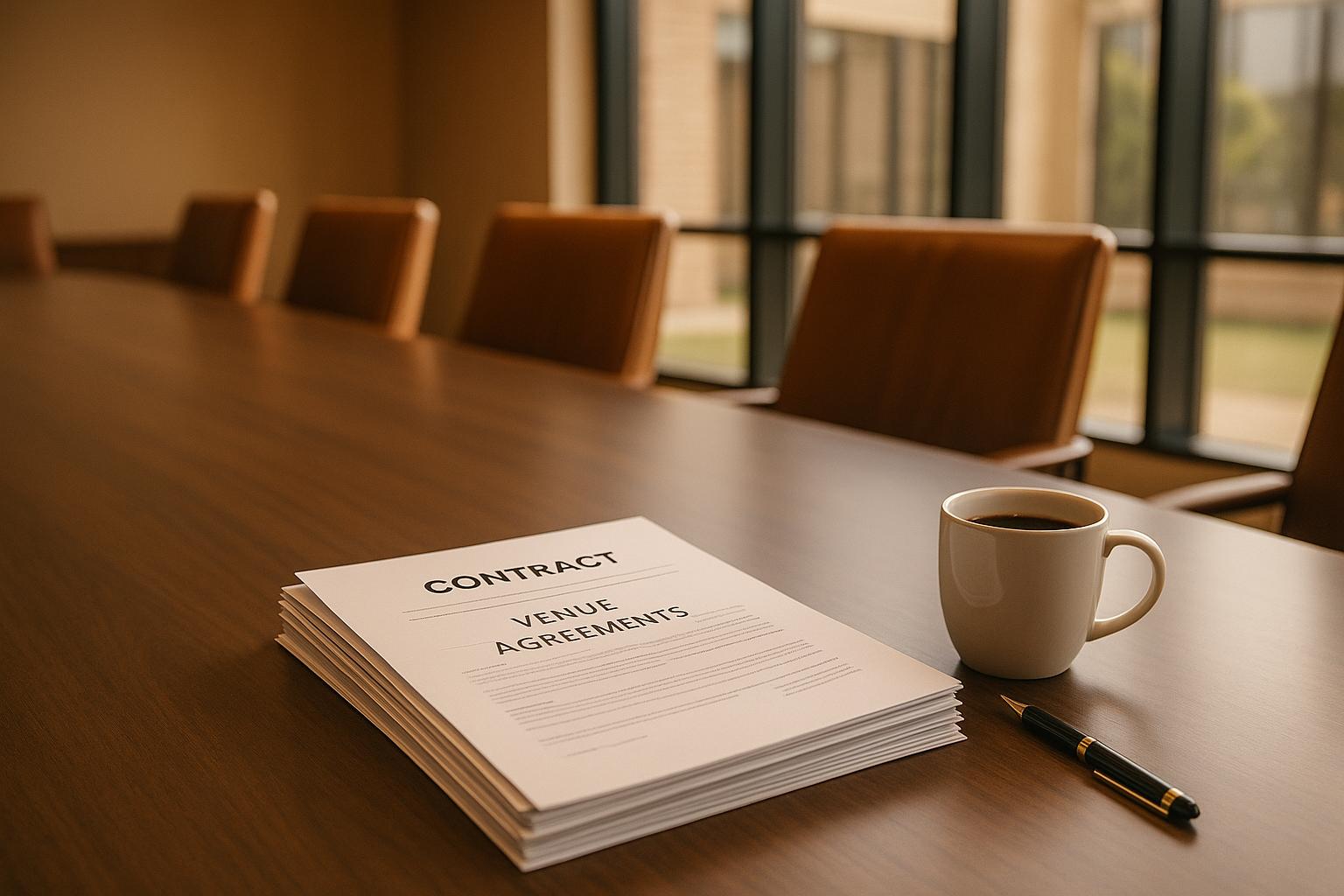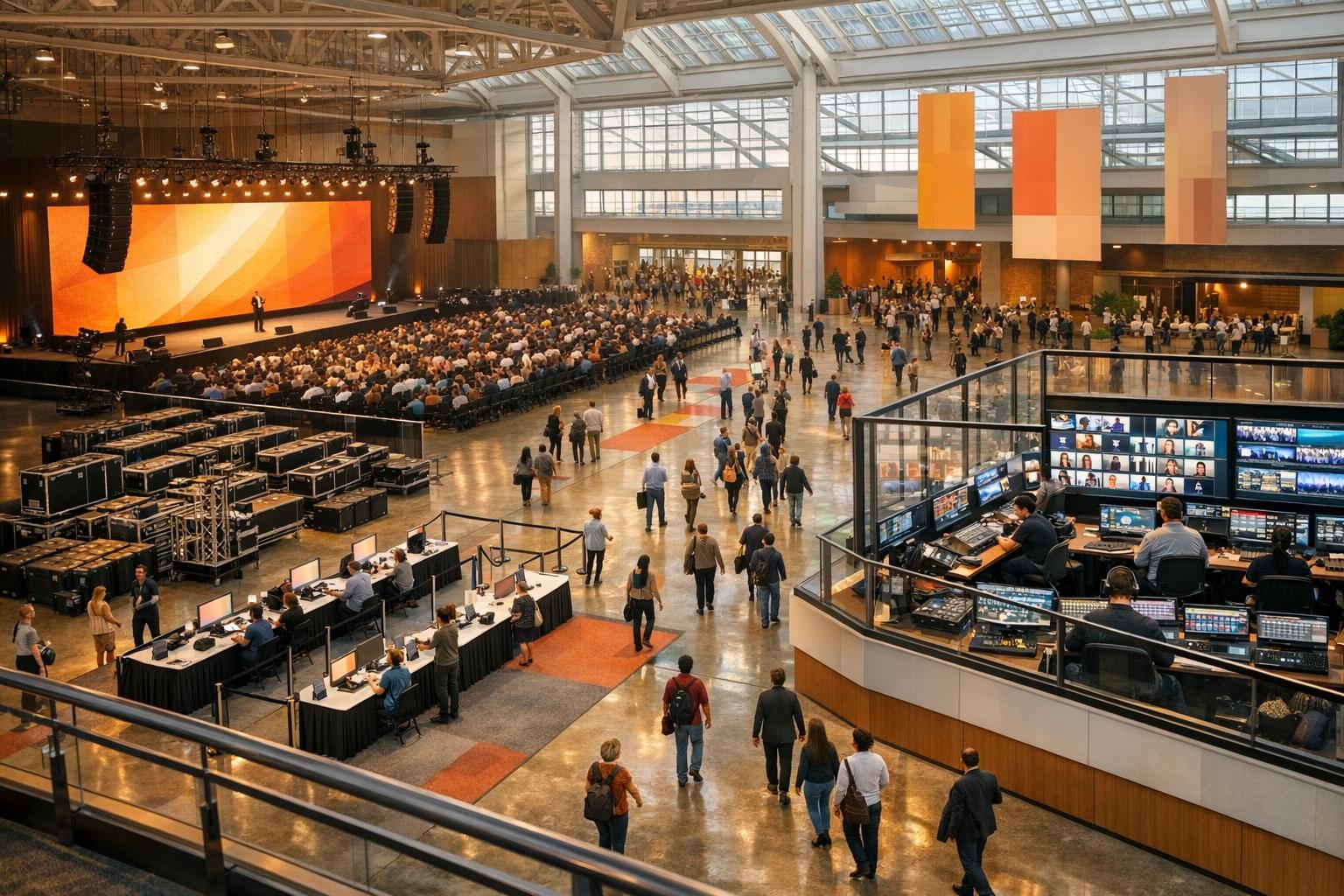Ultimate Guide to Venue Agreements

Chief Executive Officer

Venue agreements are critical for ensuring your event runs smoothly and stays within budget. These contracts outline costs, vendor policies, liability, and technical requirements, helping you avoid surprises like hidden fees or mandatory vendor restrictions. Whether you're planning a corporate event with live streaming or a small gathering, understanding these agreements can save you time, money, and stress.
Key Takeaways:
- Costs & Payments: Venues may charge flat rates, per-guest fees, or add hidden costs like security deposits or equipment rentals. Negotiate for discounts on off-peak dates or flexible payment terms.
- Access & Policies: Review setup times, vendor restrictions, and overtime fees to avoid disruptions.
- Liability & Cancellation: Understand who covers damages and how refunds work for cancellations or force majeure events.
- Technical Needs: Verify power, internet, and AV capabilities to match your event’s requirements.
- Negotiation Tips: Secure extended setup times, eliminate hidden fees, and document all changes in writing.
11 Important Things To Include In Your Venue Contract Agreement
Core Components of Venue Agreements
Venue agreements are more than just contracts - they're the foundation for your event's success and financial planning. They highlight potential challenges and provide clarity before you commit. Let’s break down the key components you need to know.
Rental Costs and Payment Terms
Venue pricing isn’t one-size-fits-all. Some venues, like conference centers, charge a fixed fee regardless of attendance, while others, such as restaurants or banquet halls, calculate costs per guest. Understanding these structures is crucial for budgeting effectively.
Payment terms are another critical piece. These outline rental fees, deposit requirements, and payment schedules. With meeting costs expected to climb by 4.3% in 2025 - reaching an average of $169 per attendee - it’s no surprise that 70% of North American event planners anticipate increased spending.
Timing can work in your favor during negotiations. Many venues offer discounts for off-peak dates, weekday events, or repeat bookings. You can often negotiate flexible deposit and refund terms, which can help stabilize your cash flow. Don’t forget to factor in extra costs, like security deposits or equipment rentals, which can add up quickly.
Access and Usage Policies
Once costs are clear, it’s time to dive into access and usage policies. These terms directly impact how smoothly your event runs. For example, agreements often specify load-in and setup times, with overtime fees applying if your event runs past the scheduled end time. Some venues also have restrictions on vendors, requiring you to use their preferred caterers, AV teams, or decorators.
If your event involves complex audiovisual setups, pay close attention to these policies. Your production team will need enough time and access to ensure everything runs without a hitch. Clear access terms can prevent last-minute delays that disrupt your event timeline.
Liability, Insurance, and Cancellation Terms
Liability and cancellation clauses are just as important as the financial details. Liability provisions outline who’s responsible for damages, injuries, or other incidents during your event. Most venues will require you to carry general liability insurance and name them as an additional insured party on your policy.
Cancellation terms often tighten as your event date nears, with refunds shrinking for late cancellations. Be sure to review these terms carefully to understand your options for changes or cancellations. Force majeure clauses - covering cancellations due to events like natural disasters, government restrictions, or public health emergencies - are becoming standard. These clauses should clearly define what qualifies as a force majeure event and how deposits or payments will be handled in such cases.
To protect yourself, set aside 10–20% of your budget for unexpected costs or contract adjustments. Cost overruns are a leading reason events fail to hit ROI targets, so having a financial cushion can make all the difference. These safeguards ensure you’re prepared for any surprises and help wrap up your event without unnecessary stress.
Finding and Evaluating Venues
When planning an event, choosing the right venue goes far beyond picking a space that looks good in photos. A thorough evaluation of the venue's technical capabilities, layout, and logistical setup is crucial to avoid unexpected issues that could derail your event. By focusing on these details, you can ensure everything runs smoothly when the big day arrives.
Technical and Logistical Requirements
The venue's technical infrastructure plays a big role in the success of your event. Start by checking the power capacity. Older venues might not be equipped to handle the energy demands of modern audiovisual equipment, which could mean additional costs for generators or equipment modifications.
Internet connectivity is another critical factor, especially for events that involve live streaming or hybrid components. Don’t just take the venue’s word for having "high-speed Wi‑Fi." Instead, test upload speeds, particularly during peak usage times. Even a venue with strong connectivity on paper can run into issues if bandwidth is shared across multiple events, leading to buffering or dropped connections.
Also, review the venue’s existing AV systems to ensure they meet your event’s needs. And don’t forget to confirm that the venue complies with ADA accessibility standards, so all attendees can enjoy the event without difficulty.
Space Size and Layout Options
The size of a venue can be misleading. Structural features, like columns or fixed installations, can significantly reduce usable space. That’s why it’s always a good idea to visit the venue in person and compare its layout to your specific event requirements.
The arrangement of the space should also align with your event’s goals. For example, theater-style seating might allow for maximum capacity but could limit interaction among attendees. On the other hand, round-table setups encourage discussion but reduce the total number of guests the venue can accommodate. Other factors, like ceiling height and available configurations, can also impact both the atmosphere and technical feasibility of your event. Additionally, don’t overlook the importance of support spaces, such as areas for registration, catering prep, speaker green rooms, and equipment storage. These spaces might come with extra fees or availability restrictions, so it’s worth clarifying these details early on.
Vendor and AV Restrictions
Many venues have preferred vendor lists or exclusive contracts that can affect your options for catering, audiovisual equipment, and other services. It’s essential to understand these policies upfront. Ask about additional fees for bringing in outside vendors, the level of technical support provided by the venue, and any restrictions on equipment, food, or alcohol.
If navigating these policies feels overwhelming, consulting with an experienced event production company, like Corporate Optics, can be a game-changer. They can help you work through vendor restrictions and technical requirements to ensure the venue aligns with your event’s vision. Addressing these details early will put you in a stronger position when it’s time to negotiate the contract.
sbb-itb-ae35a94
Contract Negotiation Strategies
When planning an event, mastering contract negotiations is crucial for keeping costs down, securing better terms, and ensuring flexibility. By focusing on the details that directly impact your budget and operations, you can set your event up for success.
Securing Setup Time and Technical Access
One key area to address is setup and breakdown times. Many venues offer limited preparation windows, which can lead to unnecessary stress on event day. Negotiating extended setup and rehearsal periods is especially important for events with complex audiovisual needs. Make sure to clarify whether these times are included in your rental or if they come with extra charges.
If you're bundling other services with the venue, use this as leverage to negotiate perks like extended setup times, free takedown services, or additional staff to help manage busy areas. Venues that value long-term relationships are often more willing to offer these benefits.
When it comes to technical access, insist on flexibility. For example, negotiate the ability to bring in your preferred AV team instead of relying solely on the venue’s in-house staff. If you decide to use the venue’s AV equipment, request complimentary technician support. Additionally, ask for essential items like podiums, microphones, adapters, and power cables to be provided at no extra cost. These details can make a big difference in ensuring smooth event operations.
Once you've addressed setup and technical needs, it's time to tackle hidden fees that could derail your budget.
Identifying and Eliminating Hidden Costs
Hidden costs are a common pitfall when booking venues. Fees for load-in and load-out, setup and strike, or penalties for extended hours can quickly add up. Be proactive in identifying these charges.
Internet connectivity is another area to scrutinize. While venues often advertise "free Wi-Fi", it may not meet the needs of larger events. For robust connectivity, you’ll need enterprise-grade internet solutions like fiber optic or coaxial cable, along with hardware from trusted brands like Cisco or Ruckus. Ensure the venue can provide separate Virtual Local Area Networks (VLANs) for different groups, such as attendees, live streaming equipment, and exhibitors. This ensures everyone gets the bandwidth they need without interference.
Ask for a detailed, itemized breakdown of all charges, including power usage, security, and cleaning fees. Clarify any additional costs that might arise if your event requirements change.
If your event involves overhead installations, negotiate for complimentary use of in-house flying points and rigging. These technical elements can represent significant savings when included in your agreement.
Once you’ve nailed down the costs, make sure every detail is documented.
Recording Contract Changes
To protect your interests, document all negotiated changes in writing. This includes everything from extended access times and complimentary services to AV provisions.
For AV services, ensure the contract outlines who is responsible for setup, testing, troubleshooting, and takedown. Never assume these details will be handled automatically - spelling them out in the contract avoids misunderstandings.
If you're planning recurring events, consider negotiating multi-year agreements. These contracts can lock in rates, secure priority booking dates, and outline any escalation clauses for future years. This approach not only saves money but also reduces the workload for subsequent events.
Keep detailed records of all amendments, including email correspondence that confirms verbal agreements. These records are essential if disputes arise or if you need to revisit specific terms during event execution.
Post-Event Obligations and Closeout
The work isn’t over when the last guest heads out the door. Just as clear terms are essential before an event, having a structured approach to post-event tasks ensures you meet all contractual obligations and sets the stage for future collaborations. How you handle this phase can directly influence your relationship with the venue and, ultimately, your bottom line. A well-organized closeout process safeguards your interests and paves the way for smoother events down the line.
Damage Assessment and Deposit Recovery
Start with a joint walkthrough alongside venue management within 24 hours. Carefully inspect the space, paying extra attention to areas like walls, floors, and ceilings, especially where equipment was installed or rigging points were used.
If you negotiated complimentary use of rigging points during the contract phase, confirm that normal wear and tear from professional installations won’t be treated as damage. For example, small holes from standard mounting hardware in designated areas should fall under routine use and not incur extra fees.
Request detailed repair estimates for any damage claims before agreeing to deductions from your deposit. It's not uncommon for venues to overstate repair costs or charge for regular maintenance that would’ve happened regardless of your event. For instance, if the venue claims carpet cleaning is required, confirm whether this was already part of their scheduled upkeep.
Document everything during the walkthrough - take photos, write notes, and request email confirmation of any identified issues within 48 hours. A clear paper trail protects you from surprise charges that might pop up weeks later.
Set a clear timeline for deposit return, ideally within 10-14 business days. If there are legitimate repairs, ask for any remaining funds to be returned promptly after deductions are made.
Once you’ve resolved any deposit and damage concerns, you can move on to reviewing the final invoice.
Final Invoice Review and Payment
When the final invoice arrives, compare it closely to the original contract. Go line by line, cross-referencing charges with the terms you agreed upon. Pay special attention to items like extended setup time, complimentary services, or AV provisions that should appear as $0.00 charges or credits.
Address unexpected fees immediately. Common surprise charges might include additional security, overtime cleaning, or equipment fees that weren’t disclosed beforehand. For example, if you see charges for upgraded internet connectivity or technical support that weren’t part of the agreement, bring these up before issuing payment.
For AV-related costs, double-check that the charges for setup, testing, and takedown match what was outlined in your contract. If you negotiated free technician support or complimentary use of basic equipment, ensure these don’t appear as billable items.
Legitimate venues should be able to provide receipts, timesheets, or work orders to back up any additional charges. If they can’t produce this documentation in a reasonable timeframe, you have a solid basis to dispute the fees.
While it’s important to pay approved invoices promptly to maintain a good working relationship, don’t hesitate to withhold payment for disputed items until the matter is resolved. Most venues are willing to negotiate rather than face delayed payments.
Documentation for Future Events
Once all invoices are settled, take the time to document your experience. Create a venue evaluation report that includes details like staff responsiveness, equipment quality, any unexpected challenges, and how issues were handled during the event. This kind of record will be invaluable for planning future events, especially if you’re considering the same venue.
Compare your actual costs to your original budget. Highlight any areas where expenses exceeded expectations and note which negotiation strategies were most effective. If you successfully secured perks like extended setup time or complimentary services, document the specific language used in the contract to achieve these outcomes.
Keep a record of key vendor contacts. Names, roles, and contact details for helpful staff - like operations managers or technical directors - can make future bookings and negotiations much easier. These contacts often move between venues, which could open doors to opportunities at new locations.
Organize all relevant documents in a digital file. Include contract amendments, email correspondence, final invoices, damage assessment photos, and any dispute resolutions. This archive serves as both a reference for future negotiations and protection if issues arise months later.
If your event is recurring, consider building a venue performance database. Track metrics like setup efficiency, technical capabilities, staff support, and overall costs. This data helps you make better decisions about venue renewals and gives you leverage in future negotiations.
Finally, schedule a post-event debrief with your internal team while everything is still fresh. Discuss what went well, what didn’t, and how venue-related factors impacted the event’s success. These insights will help you refine your venue selection process and improve your negotiation strategies for the next event.
Conclusion: Managing Venue Agreements for Corporate Events
When it comes to managing venue agreements for corporate events, success hinges on a mix of precision, smart negotiation, and thorough documentation. These elements are the backbone of controlling costs and ensuring your event runs smoothly.
Here’s the reality: 64% of attendees believe the venue can make or break an event, and 19.4% of organizers report venue costs as their biggest budget item. With stakes this high, there’s no room for cutting corners.
Every clause in your venue agreement matters. Overlooking details can lead to unexpected fees or even legal disputes. By negotiating effectively - whether it’s securing extra setup time or eliminating hidden charges - you can save money and simplify operations. Clear, well-drafted contracts leave no room for surprises, ensuring everyone involved knows their responsibilities, timelines, and costs.
Keeping detailed records of venue evaluations, cost comparisons, and contract amendments isn’t just good practice - it’s essential. These documents not only help you make better decisions for future events but also give you leverage during negotiations.
For events with heavy technical requirements, collaborating with skilled AV professionals can make a world of difference. They can help integrate technical and logistical needs into your agreement right from the start. For example, Corporate Optics specializes in streamlining this process, ensuring nothing is overlooked.
Paying close attention to venue details doesn’t just prevent headaches; it opens doors to better opportunities. By honing your negotiation and organizational skills, you’ll not only secure better terms but also spot potential issues before they arise. Over time, this expertise will strengthen your relationships with venues and make your events even more successful.
In short, mastering venue agreements isn’t just about reducing stress or cutting costs - it’s about setting the stage for consistently successful events. For any event professional, these skills are non-negotiable.
FAQs
What hidden fees should I watch out for in venue agreements, and how can I negotiate them?
Hidden fees in venue contracts often come in the form of service charges, administrative fees, overtime costs, security fees, and equipment rentals. If you're not careful, these extra costs can pile up fast.
The best way to avoid surprises? Request a detailed breakdown of all charges upfront. During negotiations, take the time to clarify policies around staffing and overtime. Make sure any potential fees are clearly spelled out in the contract. You might also have room to negotiate - venues are often more flexible during off-peak times or for larger events. By being thorough and asking the right questions, you can keep unexpected costs in check.
How can I make sure the venue meets all the technical needs for my event, like AV setup and internet access?
When choosing a venue, it's crucial to ensure it meets your event's technical requirements. Start by confirming that the venue offers high-speed, dependable internet with sufficient bandwidth to handle your needs. Be cautious of shared connections, as they can lead to disruptions during your event.
Additionally, verify that the venue has the essentials: adequate power distribution, sturdy structural support for AV equipment, and the infrastructure necessary for your setup. To avoid last-minute surprises, include all technical specifications in your agreement. It's also a good idea to schedule a site visit beforehand to double-check that everything aligns with your plans and is ready to go. This extra effort helps create a smooth experience for your attendees.
What key elements should be included in a venue evaluation report to improve future event planning?
A well-crafted venue evaluation report can make planning your next event much easier. Be sure to cover the logistical aspects - things like how accessible the venue is, its capacity, and the amenities it offers. It’s also crucial to gather attendee feedback to understand their overall experience.
Dive into essential metrics, such as attendance figures, satisfaction levels, and how effectively technical needs like audiovisual and production requirements were handled. Address any issues that came up during the event and assess whether the venue aligns with the type of event you're organizing. Wrap it up with actionable recommendations to iron out any wrinkles and set the stage for an even better event next time.
Related Blog Posts








